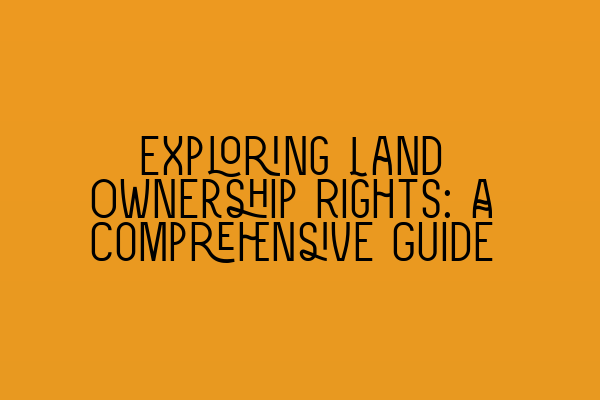When it comes to legal matters related to land, understanding ownership rights is crucial. Whether you are a property buyer, a land developer, or someone involved in a real estate transaction, having a solid understanding of land ownership can help you navigate these complex issues.
In this comprehensive guide, we will delve into the different aspects of land ownership rights, providing you with the essential knowledge you need. So, let’s begin our exploration.
1. Different Types of Land Ownership
Land ownership can take various forms, such as:
- Freehold: This refers to absolute ownership of the land, giving you complete control and rights over the property.
- Leasehold: In this case, you have the right to use the land for a specific period, usually granted through a lease agreement.
- Commonhold: This form of ownership is typically applicable to residential properties, where each unit owner has a share in the common areas.
Understanding these different types of land ownership will help you determine the rights and limitations associated with each.
2. Legal Framework for Land Ownership
The legal framework for land ownership primarily revolves around property law. It sets out the rules and regulations governing the transfer, sale, and purchase of land. Some key legal concepts you should be familiar with include:
- Title Deeds: These documents serve as proof of ownership and provide details about the property’s boundaries, ownership history, and any restrictions.
- Registered vs Unregistered Land: In many jurisdictions, land is categorized as either registered or unregistered. Registered land offers greater certainty and protection regarding ownership rights.
- Easements and Covenants: Easements grant specific rights to third parties to use or access land owned by someone else, while covenants impose certain obligations or restrictions on the landowner.
Getting acquainted with these legal concepts will enable you to safeguard your interests and make informed decisions when dealing with land transactions.
3. Protecting Land Ownership Rights
It is crucial to protect your land ownership rights to prevent any disputes or complications. Here are some steps you can take:
- Boundary Surveys: Conducting a proper survey can help define the exact boundaries of your land and avoid any encroachment issues.
- Land Registry: Registering your land with the appropriate land registry office provides legal protection and serves as evidence of ownership.
- Land-use Restrictions: Understanding any restrictions on land use, such as zoning regulations or planning permissions, is vital to avoid legal issues.
- Consulting Legal Professionals: Seeking advice from a solicitor specializing in property law can help you navigate complex legal matters and protect your rights.
By actively taking these steps, you can enhance your land ownership protection and mitigate potential risks.
4. Land Ownership Disputes
Land ownership disputes can arise due to various reasons, such as conflicting boundaries, adverse possession claims, or trespassing. Resolving these disputes often requires legal intervention and can be time-consuming and costly.
If you find yourself embroiled in a land ownership dispute, it is advisable to seek professional legal assistance to help you understand your rights and explore possible solutions. This can involve negotiation, mediation, or even litigation if necessary.
Conclusion
Understanding land ownership rights is essential for anyone involved in property transactions or dealing with land-related matters. By familiarizing yourself with the different types of ownership, the legal framework, and steps to protect your rights, you can confidently navigate this complex area of law.
To learn more about contract law and related topics, check out our related articles:
- Misrepresentation in Contracts: Unveiling Deceptive Practices
- A Closer Look at SQE Contract Law Syllabus
- SQE Contract Law: Analyzing Landmark Cases and Influential Judicial Decisions
- Understanding Contractual Capacity: Rights and Limitations
- Interactive SQE Mock Tests for Contract Law: Test Your Knowledge
We hope this comprehensive guide has provided valuable insights into land ownership rights. Remember, consulting a legal professional is always recommended when dealing with legal matters to ensure your rights are protected.
